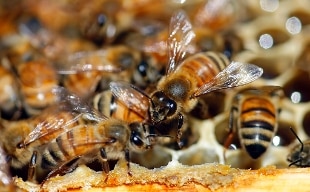- Rimini, a cloud of bees invades Piazza Cavour: "Crazy for the climate"
- Warm, beekeeper alarm: environmental disaster
Share
24 July 2019The climatic mutation, the excessive heat, the lack of a correct alternation of the seasons, the atmospheric pollution, the reckless use of fungicides, are all contributing factors of the "stress" that the Italian bees live in this period. A stress that negatively affects honey production. The alarm comes from the Alliance of agri-food cooperatives (which associates and represents over 7,500 bee-keeping companies for a total number of 395,000 beehives. The average production is 4,000 tons per year, equal to 50% of the production recorded by Istat) which met today at Rome to make a point of the situation. The trend is "very negative" for the Italian honey season which this year will see a reduction in production of over 40% with peaks of 70% in some areas. The cause is largely the climatic emergency that upsets the blooms, along with other contributory causes related to human activity. The most marginal productions, starting from acacia, are those that record the most significant declines.Red alert
The president of the Alliance of agri-food cooperatives, Giorgio Mercuri, denounces: "The main cause of lost production is due to the ongoing climate changes, with irregular seasonal trends, low spring temperatures and repeated rainy phenomena, or strong winds and floods that have strongly influenced the bee-gathering activity.The sector must be defended from threats to the environment and from commercial threats related to the invasion of foreign honey of dubious origin and sometimes polluted or adulterated.In Italy there are representatives of beekeepers, producers of queen bees, of producers of royal jelly, of beekeeping cooperatives, but today there is no structure dedicated to the enhancement of the main product of the activity, honey ".
Situation of great difficulty
Beekeepers tell of an increasingly difficult situation. In terms of blooms "there is still something in the mountains, but in the plains the heat has burned everything", therefore "the pastures should be increased to offer blooms" to the bees, replacing those destroyed by the climatic emergency or by human activities . To this end "we could use the disused municipal lands, to be left to the bees making them host the blooms". In the plain for the bees there are only "deserts: inappropriately use of pesticides, monocultures, especially maize", but also other species that monopolize the fields, and then "intensive fruit-growing and viticulture, when flowery fields are needed".
The benefits of bees
In addition to honey, there is much more, for example "without the pollination of bees we would have 35% less food on our tables", while a percentage of around 80% of agricultural plants in our country receives benefits from pollination. Moreover, on the economic relevance of the sector a significant datum is the value of the pollination service provided by the pollinators, which is estimated at about 1.5 billion euros per year.
Almost a million and a half hives in Italy
In Italy there are 51,578 beekeepers for over 1.4 million beehives (source Ismea, Report 2019). According to Istat surveys, the production of official honey is around 8,000 tons, worth around 61 million euros. Italy is the fourth EU country by sector size, after Spain, Romania and Poland. The production of Italian honey is largely underestimated as the Istat data do not take into account the particular configuration of the sector: in fact there are many hives conducted by non-agricultural companies, as well as the domestic production with its direct sale is wide. According to estimates by the National Observatory on honey, honey production would amount to over 23.3 thousand total tons. Alleanza Cooperative Agroalimentari highlights that the sector is experiencing a reversal of the trend with respect to the past with a significant growth of beekeeping companies (with VAT number and, therefore, with an economic purpose) compared to beekeepers for self-consumption (amateurs).

